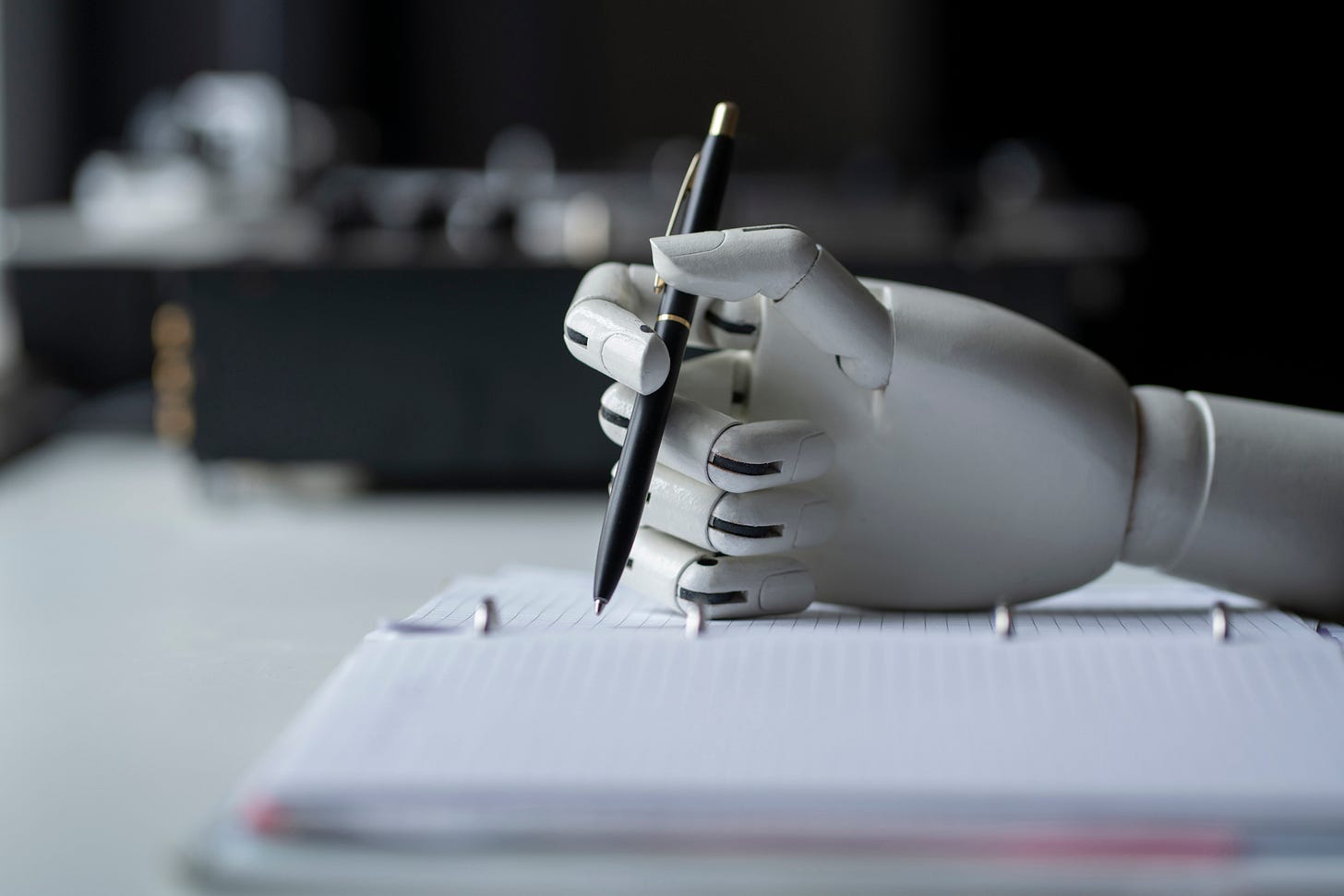You Can’t Call Me AI
Artificial Intelligence, Real Intelligence, and Whatever I’ve Got Going For Me.
Every morning, my boyfriend texts me, “Good morning [insert affectionate title or sometimes affectionate insult].” The other day, he texted me, “Good morning, baby, the Writer’s Guild is on strike.” Good morning, indeed.
Writing is probably the love of my life, no offense to my boyfriend, who also serves as my morning strike updates. I love writing; I hate almost every minute that I spend writing. There is nothing as soul-crushing, demoralizing, brain-rotting, frustrating, exhausting, and crisis-inducing as being a writer. And if anyone tells me to switch careers, I inform them, with my writer’s vocabulary and sense of timing and structure, of a few things they could do with that suggestion.
Writing is not a job that people pick up on the side because it’s easy, lucrative, and an all-around good time, in part because when you make hyperbolic claims like that, someone comes back to you and tells you that, in fact, they and 6 of their friends do pick up writing work on the side because it’s easy, profitable, and they like doing it. Now I’ve been corrected and confronted by the fact that other people find this easy, and they’re rich.
In case you think that I’m just complaining about my chosen career (I am complaining, don’t get me wrong), my point is that no one would willingly put themselves through the horror that is writing as a career if they did not feel a higher calling, a near-divine path, a need to do so. Writing is one of the most human things we can do; it’s communication, storytelling, the creation of something from nothing. Without dismissing the pain of having a child, there’s an extended metaphor to be made between writing and going into labor, and the only reason I’m not making that metaphor is so I don’t have to contemplate the writing equivalent of amniotic fluid.
“In A Couple of Days/They’re Gonna Take Me Away/But The AI Press Was Prompted To Let The Story Leak”
When the strike was authorized, I figured it was going to be over the changing media landscape that serves to make, like, six men in California extremely rich and the rest of us extremely bored with the “content” coming out of Netflix. But there was another provision, one that is proving very contentious. The WGA wants to carefully regulate the use of Artificial Intelligence in WGA projects, writing in their proposals document that “AI can’t write or rewrite literary material; can’t be used as source material; and MBA-covered material can’t be used to train AI.”
Artificial Intelligence has broadly been hailed as a game changer for creative fields, usually by people who have no idea what it’s like to work in a creative field. Fortunately, they’re wrong. For now. Generative AI, like ChatGPT, isn’t very good. It doesn’t write; it outputs. It is an advanced aggregator, taking stock of what has already been written and producing a hollow facsimile of art. There is no soul in AI, and as of right now, no quality, either.
That hasn’t stopped the grabby fingers of greed, though. Both BuzzFeed and Insider revealed plans to integrate AI into published media, and Disney CEO Bob Iger admits that the company is already using AI, although he doesn’t say how. The problem here is two-fold: it presents a real economic threat to people who write as a day job. It also proves that we have become so used to generic, mechanical schlock that a computer could seamlessly replace a mid-level writer at BuzzFeed, and the only person it will make a difference to is that writer.
Now, it might get better, although I think aiming for that is nearing Jurassic Park levels of “your scientists were so preoccupied with whether they could, they didn’t stop to think if they should.” AI might reach a point where it’s good, where the hollow facsimile is the artistic equivalent of Road Runner painting a tunnel on the side of the mountain, and we are all Wiley E. Coyote running headfirst into a solid surface. But accuracy in reproduction doesn’t mean that there’s a real tunnel, and it doesn’t mean that there’s a soul.
Just because the tunnel looks like it leads somewhere doesn’t mean that it does. Just because the human mind falls for a trompe-l’oeil does not make it real. Even if a piece of art generated by AI provokes a response from a viewer, that doesn’t mean it has a soul. The soul comes from the human behind the work, not the response from the human in front of it.
The point that always seems to be brought up when talking about AI is that it’s easy. People who write, or as I like to call them, writers, don’t write because it is easy. This was originally a very different essay, and then it was two essays, and now it’s back to one. In order to avoid writing this latest version, I moved apartments. I was going to move anyway, it wasn’t like I was fleeing a first draft that would stretch from the walls at 11:45 p.m. (the scariest time) and mutter at me, but it served as a welcome reason to not write. No one (except for those awful people I made up in the third paragraph) finds this easy.
AI is also quick. Punch in your prompt, bingo bango, you have...something. You have an output. You have badly written jokes in the style of Jerry Seinfeld, you have an article about the IRS that was supposed to be about the IRA, but you spelled the prompt wrong. That wouldn’t have happened if you had written it yourself (though I do know multiple people who would have done that, and I am one of them).
In the course of writing the previous two paragraphs, I have created a playlist on Spotify, done five pushups on the grass (do not recommend, ants will crawl on your hands), checked the weather three times despite being outside in the weather, and changed the orientation of my baseball cap four times (it’s a baseball cap, there are really only two reasonable orientations).
Writers? Not quick. Notoriously not quick. Of course, there are outliers, but I keep their names out of my mouth.
Simon Says, “Draft!”
The first play I ever had produced is introduced with a Neil Simon quotation, “God created the universe in six days, and on the seventh, He rested. And on Monday morning, He had a lot of rewriting to do.” I used that quotation in part because the play is about God, but also as a reminder. Even the Almighty needs a second draft.
Writing is possibly the closest to God that some writers will get and closer than some of them want to. It is born out of a need to write, to tell the story that’s rattling around your soul. It isn’t output; it’s creation. It’s labor; it’s work; it’s an obligation to something you cannot see or touch, merely feel in places you can’t describe. (I’ve tried, and the best I can do is a combination of “stomach” and “head,” a body part that does not exist.)
AI can’t do this. AI doesn’t think, it doesn’t need, and it doesn’t have that craving for communication (and also attention) that writers do. Even the name, Artificial Intelligence, knows this. It’s fake. Its products are a mimicry of what it has learned from, real intelligence, or organic intelligence, or the intellectual equivalent of cane sugar rather than aspartame, whatever.
It doesn’t create; it collects. It doesn’t think, not in the way that we do; it doesn’t wake up in the middle of the night to hunch over its laptop; it doesn’t leap out of the shower and get its phone all wet while frantically typing out the rising action that makes the climax make any sense at all, it doesn’t do what I just did, which is try on every dress in my closet, then unscrew all the overhead lighting fixtures in my apartment, then realize that it’s very difficult for one person to screw them back in, all because I couldn’t figure out the ending to the next section. It certainly couldn’t have decided to include that in the essay.
Writing is something divine, in my opinion, and boy, do I have opinions about the divine. But it’s because of that divinity that I’m not worried that AI is coming to replace me. AI doesn’t do what I do.
What I am worried about is that people don’t care what I do. I worry that they’re fine with replacing me and the WGA and the ghostwriters with computers because it’s easy. But easy for whom? Easy for the writer? If you want to write because it’s easy, I don’t think you’re a writer. We don’t do this because it’s easy. In fact, when it’s easy, it can feel a little weird, like getting a good passport photo. You’re grateful, but that’s not supposed to happen.
Easy for the consumer? Sure thing. I keep being forced to look at AI art and writing since I have eyes, and other people decide to take advantage of that. None of it is easy to look at or to read because it is so glaringly bad. There’s always seven fingers on a hand and 47 teeth, jokes that don’t make any sense, or worse, aren’t clever. Good writing is easy to read. It is, if not fun, then fulfilling. You lose track of time. You cry. You laugh, sometimes in inopportune places. AI writing is like when your 12-year-old cousin tells you she can play Beethoven’s Fifth on the clarinet. Yeah, there’s notes coming out, but good luck finding Beethoven in them.
Easy Like Computerized Sunday Morning
Ease was never the goal. Something sublime was the goal, something transcendent. I keep a list of pieces that I’ve read that have changed me (yes, I will share). I am 98% positive that none of them were easy in their creation (not 100% because there are some freaks out there). They were easy to read because the writer toiled over them, because an editor worked with them on restructuring and moving the hook to the third paragraph instead of buried in the fifth, because a copy editor said, “That’s three semicolons in a row there, my guy.”
It would be a lot easier for the WGA to say, “Sure, use AI. Whatever. Less of the hard stuff for us.” But they’re not, and not just because it means there are fewer jobs for writers. Because they love writing. Because they love the fact that it is human, it is communal, it is painful and heartbreaking, and sometimes you get so stuck that even moving apartments looks more appealing. We love that it isn’t easy; we can’t get enough of it.
Maybe someday, AI will be good enough that Jeff Goldblum takes off his sunglasses and gapes at a novel (which then, I guess, will eat people and traumatize two children if we’re sticking with the Jurassic Park theme). Maybe AI will get so good that it will surpass human skills. But why would you want it to?
Is the joy not in knowing that a person cared enough about what you’re reading that they created it out of electrical signals in their brain? Is the connection between reader and writer not a shared humanity that allows us to communicate our deepest, ugliest, scariest, most intimate thoughts and be understood? Isn’t it thrilling to know that the author probably cried over what you’re reading at some point or another because they wanted to get it just right?
Is the fun not in you knowing me, sitting in front of a computer in my barely decorated apartment because I finally figured out how to go about this piece? Isn’t it wonderful that we both know that the light fixtures in my apartment are very difficult to put back together and that my shoulders hurt quite a bit? Isn’t this the whole point of being a human, that you know I’m alive, and I know you are too?
Maybe it’s not. Maybe none of that is true; I’m just a romantic, an artistic Luddite (who did have some good points). But I want you to know that I laughed when I wrote the title of this essay. There’s a person behind this piece who takes delight in what she does, even when she hates it and even when the answer about the title comes from a Paul Simon song. And now, I’m going to do the most human thing of all: mess around with the lightbulbs a little more, even though I know it’s a bad idea.








On the morning this was published, June 2, Insider went on strike. As mentioned in the piece, AI has been introduced into the company. As of now, it doesn’t look like that is one of the terms that caused negotiations to break down (it looks like it was mostly healthcare and pay scale), but it will be interesting to see what the company produces while 250 members are on strike.